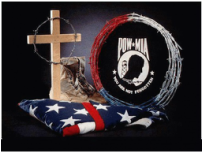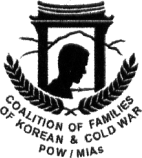Korean & Cold War Issues
The Korean and Cold War accounting missions are best characterized by their diverse issues. Each of these facets is being pursued independently, while keeping a sharp eye on the overall picture. An overarching matter has been time lost by one-Administration- after-another’s policies that link the humanitarian nature of the mission with unrelated political concerns.

Korean War
* U.S. Servicemen’s Remains Recovery and Identification - This multifaceted issue carries the most hope for the greatest number of families. More than 7500 U.S. servicemen are still missing; over 5000 sets of remains are believed to be waiting inside the DPRK.
What Needs to be Done – Joint U.S./D.P.R.K. remains recovery operations (JROs), ended in 2005, need to be reinstated and then sustained until the mission is completed.
A critical step in this direction will require diplomatic negotiations that establish the accounting mission as humanitarian policy within the U.S. administration; distinct from contentious political issues arising between the two nations.
* Air Losses Over North Korea – Crash sites for six hundred U.S. aircraft are spread across North Korea. Nine hundred missing U.S. airmen are associated with these losses. Some of these men were seen alive in enemy hands then never heard from again.
What Needs to be Done – Negotiate access to known crash sites inside the DPRK.
Small investigative teams need to visit nearby villages and gather information on what became of crew members from downed aircraft in their area. This information will guide recovery operations and help determine what happened to missing airmen.
* Last Seen Alive Reports – Documented reports from multiple sources show that American P.O.W.s remained in captivity following the Korean War, into the Cold War, and were never returned.
What Needs to be Done: Access multinational historical archives and U.S. air loss sites inside the DPRK
Former Soviet Union archives, Chinese Korean War P.O.W. camp records, and U.S. air loss sites inside North Korea likely hold information on the fate of missing U.S. servicemen known to be captive at the end of the War. Access to these records needs to be expanded and maintained, independent of unrelated issues between the nations.
* Declassification of U.S. Documents – Numerous historical intelligence reports, P.O.W. debriefings and other documents containing information on missing Americans remain classified by U.S. agencies.
What Needs to be Done: Declassify and release these records
Comprehensive legislation is needed that mandates the release of these records.
Cold War
* One hundred twenty-six American servicemen remain unaccounted for from U.S. military and civilian air losses during the Cold War, WWII through the Korean War, Cold War, Vietnam War and Afghanistan.
What Needs to be Done: Access relevant archives of China and the former Soviet Union
The U.S./Russia Joint Commission, formed to pursue records held by both nations regarding the fate of missing servicemen from all modern conflicts (including Americans reportedly transferred to the former Soviet Union) is a major resource for learning what happened to these men. Records in China’s archives may also hold critical files on U.S. air losses along that country’s coast. Access to all relevant archives needs to be negotiated and continued on a humanitarian basis, independent of contentious relations between the nations.
We call upon the governments involved to pursue these humanitarian issues until the missing men are accounted for, and in the present frame of time, not a point to come in an unending future.
